英语短语辨析
30个常用英语短语辨析

1. burn down / burn out / burn up burn down (火势)减弱,(被)焚毁;burn out烧尽,熄灭;burn up 被烧掉(毁),烧得更旺。
2. how often / how long / how far / how soon how often有"多久一次"的意思,是对做某事的频率提问。
对how often的回答一般是:twice a year/three times a week。
how long表示"时间多久或物体多长",表示时间时侧重指"一段时间"。
对how long的回答一般是时间段,如for three days。
how far是提问"路程有多远",询问距离",主要用来对表示将来的,还可以表示程度。
how soon表示"多久之后的一段时间提问。
对how soon的回答一般是:in + 时间段,如in two days/in five years。
3. call at / call back / call for / call in / call on / call upcall at (a place)访问(某地);call back回电话; call for (公开)要求,需要; call in要求退回,召来;call on邀请,请求; call up使回忆起,使想起。
4. come about / come across / come off / come out / come true /come upcome about发生;come across(偶然)遇见;come off能被去掉(或除去);come out出版,发行; come true变为现实,实现;come up长出地面,升起。
5. cut down / cut off / cut through / cut up / cut in cut down砍倒,削减;cut off打断,中断(供给);cut through开辟(出路或通道);cut up(严重地)割伤,打伤,切碎;cut in插嘴。
初中英语易混词、短语辨析
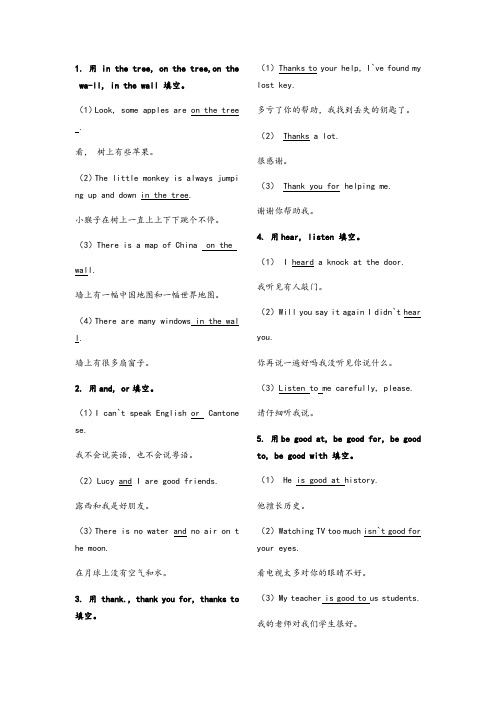
1. 用 in the tree, on the tree,on the wa-ll, in the wall 填空。
(1)Look, some apples are on the tree .看,树上有些苹果。
(2)The little monkey is always jumpi ng up and down in the tree.小猴子在树上一直上上下下跳个不停。
(3)There is a map of China on thewall.墙上有一幅中国地图和一幅世界地图。
(4)There are many windows in the wal l.墙上有很多扇窗子。
2. 用and, or填空。
(1)I can`t speak English or Cantone se.我不会说英语,也不会说粤语。
(2)Lucy and I are good friends.露西和我是好朋友。
(3)There is no water and no air on t he moon.在月球上没有空气和水。
3. 用 thank., thank you for, thanks to 填空。
(1)Thanks to your help, I`ve found my lost key.多亏了你的帮助,我找到丢失的钥匙了。
(2) Thanks a lot.很感谢。
(3) Thank you for helping me.谢谢你帮助我。
4. 用hear, listen 填空。
(1) I heard a knock at the door.我听见有人敲门。
(2)Will you say it again I didn`t hearyou.你再说一遍好吗我没听见你说什么。
(3)Listen to me carefully, please.请仔细听我说。
5. 用be good at, be good for, be good to, be good with 填空。
初中英语重点短语辨析

初中英语重点短语辨析1. be made of / be made fromⅠ. be made of “由……制成/造”成品看得出原料。
如:The desk is made of wood. 这张桌子是木头制成的。
Ⅱ. be made from “由……制造/成”成品看不出原料。
如;Paper is made from rags.纸是由破布做的。
(已看不出原料)2. be pleased with/ at/ toⅠ. be pleased with “对……人/物,感到满意”介词with后接人或物。
如:① Both Mark and her mother were pleased with the girl. 马克和他妈妈都有喜欢这个女孩。
② I wasn’t very pleased with / at my exam results. 我对自己的考试成绩不太满意。
Ⅱ. be pleased at “对……某事/物,感到满意”。
介词at 常与事物搭配使用。
He was very pleased at the news.他对这个消息感到很满意。
Ⅲ. be pleased to “乐意……;因……而高兴”。
to 不是介词,而是小品词。
后接动词原形。
如:① I shall be pleased to go. 我将乐意去。
② We are quite pleased to be working in this country. 能在这个国家工作,我们是十分高兴的。
3. be sure of/ be sure to do/ be sure thatⅠ.be sure of “确信对……有把握”后接名词、代词或动词-ing 形式,表对客观事物有肯定的认识和判断,主语必须是人。
如:① As David joined our team, we are sure of winning the game this time.由于David参加了我们的球队,我们这次有把握取胜。
【语法】初中英语相似(易混)短语辨析

初中英语相似(易混)短语辨析(一)1.a bit ;a little【辨析】两者均可作程度状语,修饰形容词或副词,常可换用。
如:He came here a little (a bit)early.他来的有点早。
a little可用作形容词,直接修饰不可数名词,a bit则不能,但可与of构成短语,其功能与a little相似。
如:Give me a bit of (=a little)milk ,please.请给我一点牛奶。
注意:not a little(much)“很多”,“不少”;not a bit (=not at all)意为“一点也不”,“一点儿也没有”。
『练习』用a little a bit填空①He is_______ taller than Tom.②There is ______water in the glass.Keys:①a bit②a bit/a little③a little/a bit of2.a few ;a little【辨析】这两者均可表示“一点(儿),一些”。
但a few 修饰可数名词,而a little 修饰不可数名词。
『练习』用a few a little填空①He knows______English.②I am going to buy ______apples.Keys; ①a little ②a few3.afraid of afraid to;afraid for(about)【辨析】afraid of---意为“害怕;忧虑;担忧”,后可接名词、动名词或从句,它着重强调对可能产生的后果担忧或忧虑。
如:She was afraid of walking her husband up.她担心会吵醒她的丈夫。
afraid to ----意为“害怕,不敢”,后接原形动词,它着重指不敢或害怕去做某事。
如:I am afraid to see him,我不敢见他。
高中英语2024届高考复习介词短语辨析(共十组)

高考英语介词短语辨析(一)at peace 处于和平中at war 在战争中at work 起作用at ease舒适,无拘无束at hand 在手边,在近处,可能很快发生at heart 内心里,本质上at will 随意,任意at random 任意地at the mercy of 任······处置/摆布at the price of 以······的价格at the cost of 以······为代价in comfort 舒适地in anger生气地in battle 在战斗中in despair 绝望地in high/low spirits 情绪高涨/低落on display/show 陈列on exhibition 在展出on fire 着火on sale 出售,打折on the increase/decrease 在增加/减少(二)beyond recognition 认不出beyond description 难以描述beyond repair/control 无法修理/控制beyond sb.'s comprehension 超出某人的理解能力beyond compare 无与伦比beyond belief 令人难以置信by means of 依靠,借助于,用by virtue of 凭借,依靠,由于by and by 不久by day 日间,白天by the day按天(计)by mistake 由于疏忽所致by nature 天生地(三)in the shape of 以······的形状in pursuit of 追求,寻求,追逐in the face of 面对in search of 寻找,寻求in possession of 拥有in place of 代替in fear of 在对······的担心中in praise of 称赞,歌颂in the form of 以······的形式in case of如果,假使in terms of 就······而言in charge of 负责,掌管in the charge of 由······负责/掌管in the hope of怀着······的希望in spite of 尽管;不管in support of 支持;拥护in need/want/demand of 需要in advance of 在······前;超过in/over the course of 在······期间in the direction of 向着······方向in favor of 支持,赞同in case of如果,假使in control of 掌管,管理,控制in the control of 处于······的控制之下(四)in advance预先,超前in common 共有,公in error 错误地in flower 在开花in nature 本质上in person 亲自,本人in safety 安全地in vain 徒劳地in season(水果等)应时的,旺季in exchange for 交换in secret 秘密地in a sense 从某种意义上说in the wild 在自然环境下,在野外in force 已生效,实施中in response to 响应,回答,作为对······的回应in accordance with 按照,依据,与······一致in preparation for 为······做准备in other words 换句话说in part在某种程度上,部分地in a word/in short/in brief 简而言之in general 一般来说1in contrast to 与······对比鲜明,与·······相反in detail 详细地in return for作为(对······的)回报(五)on earth在世界上,究竟on occasion 偶尔,有时on no account绝不on behalf of 代表······,为了·······on hand 现有(尤指帮助)on the basis of 基于······,以······为基础on the contrary 相反地on condition that 如果······,在······条件下on account of 因为on a tight schedule 日程很紧out of mind 发疯out of breath 气喘吁吁out of the question 不可能out of control 失去控制out of date 过时的out of sb.'s reach 某人够不着out of shape 走样,不成形(一六)in trouble 处于困境中out of trouble 摆脱困境in danger 在危险中out of danger 脱离危险in debt负债out of debt 不欠债in order 正常;妥当,适宜out of order 出故障;安排不当in fashion 流行out of fashion 过时,不流行in good condition 状况良好out of condition 状况不佳in sight 在视野之内out of sight 在视野之外in place 在恰当的位置out of place 不在恰当的位置,不得体,不适当in business 从事业务活动out of business 停业,歇业in work 有工作out of work 失业in office 任职out of office 在野,不执政(七)under treatment 在治疗中under repair 正在维修under discussion 在讨论中under construction 在施工中under attack 受到攻击under consideration 正在考虑中under the guidance of 在······的指引下under threat 受到威胁with delight/fear 高兴地/害怕地with satisfaction 满意地with difficulty 困难地with ease 轻而易举地with pride 骄傲地with pleasure 高兴地,很愿意with the help/aid of 在······的帮助下(八)1.in terms of就...而言,in view of由于,考虑到2.at a time每次at one time曾经,一度at the same time同时at times=sometimes有时in time及时on time准时for the time being暂时in no time立即,马上3.in this/that case在这/那种情况下in any case论如何,不管怎样in no case无论如何不in case of如果,假设4.in turn依次轮流,逐个by turns轮流地in return作为回报5.on the point of doing sth.正要to the point简洁中肯,简明恰当6.in memory of作为对······的纪念in honor of为向·······表示敬意7.by name凭名字,用······的名字by the name of名叫······的2in the name of代表以······的名义in name only名义上under the name of用·····的名字8.apart from除了...外,要不是aside from此外,加之except for除....之外in addition (to)除...之外还(九)side by side 肩并肩地step by step 一步一步地one by one一个接一个地little by little 一点一点地day by day 一天天地,逐日year after year年年,每年arm in arm 臂挽臂地hand in hand手牵手地face to face 面对面地back to back 背靠背地shoulder to shoulder 肩并肩地above all首先,最重要的是after all 毕竟all in all 总之according to 根据......所说,按照all over the country 遍及全国around the corner 即将来临,在拐角处for fear of 唯恐,以免for the benefit of 为了......的利益up to 直到,至多over and over(again)反复地,一再,多次regardless of 不管,不顾due to/owing to/thanks to 因为on the whole 总之,大体来说rather than 而不是other than 除了on top of 在......之上,胜任(工作等),除......之外(还有其他问题)(十)be curious about 对······感到好奇be concerned about 对······担心be crazy about 对······着迷be enthusiastic about 热衷于be particular about 对······挑剔be astonished at 对······吃惊be present at 出席be qualified for 胜任be addicted to 对······上瘾be accustomed to 习惯be beneficial to 对······有益be devoted to 致力于be equal to等于;与······相匹敌be grateful to 对······感激be absorbed in 全神贯注于be involved in 包括在······中,被卷入be lacking in 缺乏be occupied in 忙于be engaged in 从事be opposed to反对be capable of 能够be composed of 由······组成be convinced of 坚信/确信be bored with 对······感到厌倦be strict with 对······要求严格be content with 对······满意/满足be crowded with 充满3。
解决让你纠结的英语短语辨析

解决让你纠结的英语短语辨析一、no more than 与not more than1. no more than 的意思是“仅仅”“只有”“最多不超过”,强调少。
如:This test takes no more than thirty minutes. 这个测验只要30分钟。
The pub was no more than half full. 该酒吧的上座率最多不超过五成。
For thirty years,he had done no more than he (had)needed to. 30年来,他只干了他需要干的工作。
2. not more than 为more than (多于)的否定式,其意为“不多于”“不超过”。
如:Not more than 10 guests came to her birthday party. 来参加她的生日宴会的客人不超过十人。
比较:She has no more than three hats. 她只有3顶帽子。
(太少了)She has not more than three hats. 她至多有3顶帽子。
(也许不到3顶帽子) I have no more than five yuan in my pocket. 我口袋里的钱最多不过5元。
(言其少)I have not more than five yuan in my pocket. 我口袋里的钱不多于5元。
(也许不到5元)二、no more……than 与no t more……than1. no more……than 表示对两者都否定,意为“同……一样不”(= neither……nor……)。
如:He is no more a writer than a painter. 他既不是画家,也不是作家。
(=He is neither a painter nor a writer.)He‘s no more able to read Spanish than I am. 他和我都读不懂西班牙语。
人教版丨八年级英语下册unit 04 单词短语辨析

人教版丨八年级英语下册unit 04 单词短语辨析Ⅰ. allow用法allow sb. to do sth 允许某人做某事【拓展】allow v 允许allow doing sth 允许做某事They don’t allow smoking.allow sb. to do sth 允许某人做某事My mother allows me to watch TV.be allowed to do sth 被允许做某事【典型例题】1.His mother ____ him ____ the games.A is allowed, to playB. doesn’t allow , to playC doesn’tallow playD. is allowed play【答案】B【解析】考点:考查语态及非谓语动词Ⅱ. until, so that ,although的用法:Until:在带有till或until引导的时间状语从句从句里,如果主句用肯定式,其含义是“一直到…时”,谓语动词只能用延续性动词。
如果主句用否定式,其含义是“直到…才…”, “在…以前不…”, 谓语动词可用瞬间动词。
例如:The young man read till the light went out.Let’s wait until the rain stops.We won’t start until Bob comeDon’t get off until the busstops.so that:引导目的状语从句so that(为了,以便)例如:We started early so that we could catch the first train.He studies hard so that he could work better in the futureAlthough:although的用法意思相当于though (尽管,虽然),用来引导让步状语从句。
英语短语辨析B

1.短语辨析B) rest on近似于depend on, rely on或be based on;A)put forward“提出;推荐” put sb. forward as a candidate推举某人为候选人;C) make for“走向,扑她没有遇到质疑,因为她的论点是建立在可靠基础之上的。
2.·动词词组辨析A) get across“被理解,被接受”;B) come around“复苏,康复;顺便来访”;C) go by“(时间)过去;遵守,遵循” go by traffic rules遵守交通规则;D) make out“开出;辨认出;理解”。
老师试图解释这个问题,但她的解释未被学生理解。
3.短语动词辨析feel like表示“想要”,后面只能接动名词;tend to“倾向于,往往”,后接动词原形;be inclined to “倾向于,欲”,后接动词原形;make for“向/朝…走去”。
天气这么热,大家都想在河里游泳。
4.短语动词辨析pull through “使渡过难关,康复”;pull up“停下,停”;pull back“拉回”;pull out“拔出”。
布朗老先生的情况看来很严重,真令人怀疑他是否能挺过来。
5.比较从句该题较难理解。
根据句中more一词选择than填入空格,后面所接的句子中省略句子主语it。
再如:我们经常建议他不要喝太多的酒,对他的身体不利。
6.动词辨析四个选词均为形近动词,但意思不同。
confess“承认”;confirm“证明,证实,确认”;confuse“使迷惑”;confine“限定,限制,困在”,后接to。
请将你的发言紧扣所讨论的主题。
7.形近动词辨析四选词的意思分别是:A)resist“抵抗,抵制”;B)insist“坚持,坚持认为”;C)persist“坚持,持续”;D)assist“协助,帮助”。
已制定了几个专门计划来帮助16岁至21岁生活状况差的年轻人成为更有责任心并可以自食其力的人。
高中英语动词短语辨析

第一版本:易混动词短语辨析1. die off= die away消失(离远去)die down 声音逐渐变弱,变小2.go out 1)出去;2)出去参加社交活动;3)灯熄灭(go out = be out)set out 1)出发;2)开始come out 1)得出;2)开花、发芽;3)出版work out 1)计算出;做出;制定出;2)出去锻炼;3. take up 开始从事职业、职务take over接管take on 1)呈现(色彩,面貌);2)雇佣;3)承担take off 1)脱下,取下;2)事业起步,飞机起飞4.Pick up 1)偶然学到;2)开车去接;3)局面好转Pick out 辨认出5. hand out=give out=share out=distribute 分发result in=lead to=bring about导致6. cut off 1)切断(水,电)的供应;2)断绝关系、联系cut up 1)切成小块,砍碎;2)连根拔起cut down 1)切成块;2)减少7.Run smooth 进展顺利(不用smoothly)Go smoothlye off =fall=drop花凋落Keep off 远离,不靠近Leave off= stop停止Set off 1)放烟花;2)使爆炸9.make up 补足;化妆;编造Make up for弥补10.put up with=come to terms of忍受Keep up with=catch up with跟上;赶上in terms of就….而言,关于…..;涉及…..11.go through 1)=live through经历,渡过;2)=look through仔细检查;3)通过get through 1)接通get through to sb;2)完成,读完书,写完东西3)通过12.set up树立;创立Put up挂起;张贴Send up使上升13.put away收好、放好Take away脱下、放下外在的东西14.bring back使想起bring about产生Vtbring up 1)培养;2)吐出come about产生Vi15.call on 1)访问;2)号召Call for 1)需要;2)号召16.send up 1)发射(satellite, rocket, signal )2)把…..关入监狱send sb up=send sb into prisonSign up for报名参加,注册Try out for参加17. call up 1)召唤;2)使想起=bring back3)调动(人员、力量);4)提出(议案)=come up4)给….打电话18.at ease 平静、宁静With ease轻松地do sth with easeease v.缓解unease焦躁,不安的19.go about开始做、着手于get about=get around到处走动20.do away with=call off=cancel=abolish取消,废除(规定、制度)Break away from脱离21.give out 1)发出尖叫;2)耗尽、用完;=run out;3)分发、分配give off发出烟、气味smell/smokelet out 1)让…出去;2)泄露put up 1)张贴put up the notice;2)举起break into 1)破门而入;2)大的变小22. by the way顺便说In the way挡住….的去路on the way在去…的路上23. provide for sb=support sb供养provide for sth为可能发生的事情做好准备24.at a time一次、每次at no time= in no way= by no means= on no account绝不in no time= at once= in a moment = right away 立刻、马上at a time一度、曾经25. call for 1)要求、需求;2)约某人、去叫某人;3)号召call on 1)拜访call on sb; call at sp;2)号召call in调集call in the police,call in the army26.for the moment当时、在那个时候for a moment一会儿at a moment当时、这时(at present)in a moment= right away= in no time立刻,马上right now= just now刚才27.put off=delay推迟put up 1)举起;2)张贴;3)忍受put up withput away 1)收起、收好;2)存钱28.go away走开、离开;拿走、带走go off出发;爆炸;铃响;go off to Japango out出去;灯熄灭run out (物品、钱)用完give out(力气、耐心)用完、耗尽29. refer to= deal with= cover涉及set down= put down=write down写下shut down= cut off关闭;与外界隔离30. give sb a ride= give sb a lift给某人搭顺风车take hold of抓住give away= donate 捐赠31. hold back阻止hold on 1)别挂断;2)别松开、别松手;3)拥有、占有、保存有hold up 1)被(雨、交通)困住;be held up= be stuck with2)举起、支撑起、顶起32. go about 1)=set about开始做、着手于;2)=deal with处理3)wander about四处走动33.get there=make it成功get across传达、让….清楚;明白get along进展,和….相处get in 1)收割get in the crops;2)插话get into 1)进入…里面get into trouble;2)上车get into the car/ get out of the carget off 下车get off the bus/ get on the busget through 1)接通;2)完成;3)穿过get up 1)站起来;2)起床34.give away 1)捐赠,赠送;2)泄露、透露(无意)=let out (有意或无意)give back归还give in to sth屈服,让一步give out 1)分发=hand out= distribute2)(体力、精力)耗完,耗光give up放弃35.stick out突出、伸出36.call up 1)唤起;2)给…打电话call for 1)要求= require;2)约某人、哈某人call on 1)看望、拜访;2)掉军队;3)号召call in 调军队、叫警察call off 取消37. bring in 引进;带来bring up 1)抚养be brought up;2)呕吐bring out 1)将….拿出来;2)将….阐述清楚bring about 1)使产生、使出现;2)造就bring about the best charater of sb 38. put forward提出Put on 1)穿上;2)表演Put up with=bear= stand忍受39.think over仔细考虑Think of/ about想起Think up想起、提出40.be close to= get close to 1)接近、靠近;2)快要、将要be/get close to sbe up用完、用光VtGive out=run out Vi42.hand over将….交给某人43.add to增加add up to总共是44. go over复习、预习、过一遍go through浏览、仔细地看e around出来;到来come along走上来come out出版;生产;扑灭;关掉give rise to= bring about= result in= lead to带来;产生;导致46.pay off 1)得到回报(Vi,不及物,没有被动语态)hard work + pays off+will pay off2)还清债务(Vt)His debt has been paid off.set off 1)引爆烟花set off the fireworks2)引来激烈讨论3)引来波动give off 发出光、热、气味give out(Vi)耗尽、用完(力气、体力)run out(Vi)耗尽、用完(物品、钱)47.turn around转身turn over翻身48.put forward= come up with提出49.may as well做….也行may well完全可以、很有理由50.take in 1)接收活干;2)接收、吸收;3)被欺骗take up 1)占据;2)开始从事take on 1)承担;2)雇佣;3)呈现51.open up 1)引发=set off;2)提供;3)开采、开发52.fall over 摔倒、被….绊倒jump over跳越turn over翻转53.keep up 1)维持、保持;2)持续close up 1)商店短时间的关门;2)对…避而不谈close down 1)工厂、商店倒闭、关闭;2)电台停止播报节目shut down(工厂)倒闭shut up闭嘴54. add up to 1)总共;2)意味着add to增加55.round up= drive sth/sb together使聚拢56.think out仔细考虑然后做出计划think up想出57.bring sth out把….带到外面take out拿出来carry out贯彻、执行turn out 后来证明;生产58.turn on打开(电源)go on发展、发生act on作用于59.give out 1)发出气味等;2)力气耗尽give off发出光亮60.break free挣脱、获得心灵的、精神的解放break out战争、争吵、火灾等爆发break down 1)(车辆)抛锚;2)谈判破裂;3)身体跨掉;4)塑料降解break up破裂、关系中断break off停止说话、突然中断break in闯入;打断(说话)61.stick to坚持…观点stick with支持62.draw up 1)起草、草拟;2)车停下63.cover up掩盖、掩饰roll up关闭64.make out 弄懂、理解hold out 1)持续、维持;2)在困境中获胜come out 1)书出版;2)花开;种子萌发send out 发出(光、热、气味)pick out 1)挑选;2)认出来;3)凭记忆慢慢地演奏hold up 1)举起、支撑;2)塞车65.apply to 1)适用于apply A to B;2)申请apply to sb for sthapply for sth申请66.die down火势减小die away 1)离开、远去(身影、影子);2)(声音)愈来愈小67.give out 1)分发;2)力气用完give off 发出光亮、气味第二版本:1. 以break为中心的词组break away from 脱离,逃离break down 破坏,粉碎;瓦解;出故障,抛锚break in 闯进,打断;使顺服break into 闯入;强行进入;突然开始break out 爆发,发生;准备使用;起锚break the law 违反法律break the record 破记录break one’s promise 失言break up 开垦,破碎;解散,分开,分解2. 以catch为中心的词组be caught doing 被发现做某事be caught in the rain 淋雨catch a bus/train 赶汽车/火车catch a cold 伤风,感冒catch one’s word 听懂某人的话catch sight of 发现,瞥见catch up with 赶上,追及,追上3. 以come为中心的词组come across 偶尔发现,想起;越过;偿付come along 一道来,陪伴;进步,进展;出现come at 达到,求得,得到;扑向,袭击come back 回来;恢复,复原come down 倒下;降落;跌落;病倒come from 来自,起源于,从~~产生,生于come in 进来,进入;流行起来;获名次come into being 发生,产生,出现,形成come into power 开始执政,当权,当选come into use 开始使用,获得应用come on 上演;开始;赶快;发展;登台;(问题)被提出come out 出来,传出;出版;结果是;褪色;(秘密)泄露come to 苏醒,复原;共计;达到;归结于come to an end 终止,结束come to know 开始了解到come true 实现,成为现实;证实come up 走近;上楼;长出,发芽4. 以do为中心的词组be done in 精疲力竭be done with 完全结束do a good deed 做一件好事do away with 去掉,废除;弄死;浪费do good to (=do sb. good) 有益于do harm to (=do sb. good) 有害于do its work 有效,有作用do much 极有用do wrong to 做错do one’s best 尽某人最大努力do one’s homework 做作业do one’s utmost 尽力而为do proud 足以使~~骄傲do sb. justice 公平对待某人do some cleaning (V+ing,etc.) 搞卫生do sb. a favor 帮助某人do well in 学得不错,干得漂亮do with 和~~相处,忍受,处理do without 不需要,不用do wonders 创造奇迹have much to do with 和~~很有关系have nothing to do with 与~~无关have something to do with 和~~有关in doing so=in so doing 这时,在这种情况下That will do. 行了;够了5. 以get为中心的词组get about 徘徊,走动,旅行;流传get above oneself 自视高傲get accustomed to 习惯于,对~~习以为常get across 度过,通过,横过;说服,使理解get ahead of 胜过,超过get along 前进,进步;同意;离去get along with 与~~相处get at 发现,了解;掌握;攻击get away 离开,逃脱get back 取回,回来;报复get behind 落后;识破get down 咽下;写下;使沮丧,使抑郁get down to 认真对待,静下心来get familiar with 熟悉get hold of 获得,取得get home 到家get in 进入,陷入;牵涉get off 送走;脱下(衣服);下车;动身get on 上车;穿上;进步,使前进;成功;相处get upon with 进步;在~~方面获得成功get one’s hand in 熟悉;习惯get out of 由~~出来,从~~得出;避免;退休get over 越过;恢复,痊愈;克服;完成get ready for 为~~作准备get rid of 除去,去掉;免除,摆脱get through 到达,完成,通过;及格get together 积聚,积累;商谈,取得一致意见get up 起床,起立;研究,钻研;致力于;安排,组织get used to 习惯于have got to do 不得不,必须6. 以give为中心的词组be given to 沉溺于,癖好give about 分配;传播give and take 相互迁就give away 赠送;牺牲;泄露;颁发give back 归还give cause 给予~~的理由give ear to 侧耳倾听give forth 发出,放出;发表give in 屈服,让步,投降give in to 同意,接受;向~~让步give off 发出(烟,气味)give oneself out to be/as 自称为give oneself up to 专心于;向~~自首give out 分发,公布give place to 让位于,被~~所替代give rise to 引起,导致;使~~发生give sb. to understand 通知某人give up 放弃;停止give way to 让步,退却;屈服于7. 以look为中心的词组look about 四下环顾;查看look after 照顾,看管look around 东张西望look at 注视,着眼于look back 回顾look for 寻找;期待,期望look down on 俯视;轻视look forward to 盼望,期待look into 窥视;调查;浏览look like 看起来象look on 旁观;面向look out 向外看;注意;当心,堤防look over 从上面看过去;检查look through 透过~~看去;看穿;浏览look up to 仰望,尊敬8. 以make为中心的词组be made from 由~~原料制成be made of 由~~材料制成be made up of 由~~组成make a fool of 愚弄,欺骗make a mistake 弄错make a point of doing 强调;认为~~重要;决心,坚持make advantages/use of 使用,利用make after 追求,追赶make believe 假装make certain 确信,把~~弄清楚make contact with 接通,与~~接触,与~~联系make for 去向,向~~前进;有利于make friends with 和~~交友make into 把~~制成,使~~转变为make much of 重视;理解;赏识make one’s mind on sth. 决定某事make one’s own 当作自己的看待make oneself at home 随便,别拘束make out 填写;开支票;理解;辨认make the best of 尽量利用;极为重视make up 弥补,修理;赔偿,补偿;起草;编造;化装make up to 接近,巴结;向~~求爱make way for 为~~让路,让路于on the make 急求成功;增加9. 以put为中心的词组put aside 把~~放在一边;搁置;排除put away 把~~放好,把~~收拾;储藏;吃喝,吃掉put back 把~~放回原处;驳回put down 放下;镇压;制止;记下;削减;降落put forward 提出;拨快;建议,推荐;提倡,倡议put ~~ into 把~~放入;插入;翻译成put off 推迟,延期;消除;推脱,推辞put on 上演;穿上,带上put one’s heart into 全神贯注,专心致志put up 举起,挂起;提名,推荐;陈列put up with 忍受,容忍10. 以take为中心的词组be taken aback 吃惊take a seat 就坐take a shower 淋浴,洗澡take aim 瞄准,设立目标take away 拿走,减去;夺去take ~~ by surprise 出奇制胜take care of 当心,注意;照顾;提防;谨慎;处理,对付;负责take ~~ for 把~~当作take off 脱去,除去;离开;起飞;模仿;起程;致死;复制,作副本;减弱take office 就职,上任take one’s place 就坐,入坐take one’s temperature 量体温take part in 参与,参加take place = happen 发生,举行take the place of 代替take pride in 以~~为荣,对~~骄傲take sb. by the arm 拉某人的胳膊take it easy 别着急,慢慢来11. 以turn为中心的词组give a new turn to 对~~予以新的看法in one’s turn 轮到某人做某事out of turn 不按次序的,不合适宜的take one’s turn to do 轮到做turn a blind eye to 对~~视而不见turn against 背叛,采取敌对态度turn back 折回,往回走turn down 折叠,翻下,驳回,拒绝考虑turn into 走进;变成,变为turn to ~~for help 求助于turn off 关上(自来水,电器开关);解雇,辞退;避开(问题);制造;生产turn on 打开(自来水,电器开关);反对;依靠,依赖,取决于turn one’s attention to 把注意力转向turn out 培养;证明是;制成;实际情况是turn out to be 原来是,证明是,结果是turn over a new leaf 翻开新的一页,重新开始,改过自新turn (a)round 旋转,转过身来;改变意见;采取新政策turn to 变成;着手于turn upside down 颠倒过来,翻过来;使陷入混乱。
常用高中英语词语辨析

常用高中英语词语辨析105组1.elder 与elderly两者都为“年老的”,但有细微的差别。
elderly 指中年与暮年之间的年龄,表示人已过中年,因此,这词常用来代替 old。
如:anelderly gentleman. 一位年长的绅士。
elder 指年龄稍长者,适用于家庭的兄弟姐妹之间。
如: Tom is the elder of the two. 汤姆是两个孩子中较大的一个。
2.precious 和 expensiveexpensive 表示“昂贵的”。
如:The drink was cheap , but the food was veryexpensive . 饮料很便宜,但食物很贵。
precious 表示“珍贵的,宝贵的”。
如:The children are precious to me . 孩子们对我来说很重要。
3.regret to do 和 regret doingregret doing 表示“做了某事而感到遗憾或后悔”,v-ing 动作发生在regret 之前。
如:Iregretted missing the train. 我为没有赶上火车而感到很懊恼。
regret to do 指“当时或现在遗憾地做什么”。
如:I regret to tell you that we can'tstay here any longer. 我遗憾地告诉你,我们不能在这儿多呆了。
4.day by day 和 day after day两词组意思很近,但有区别:day by day 只用作状语,表示“一天天地”,有逐渐转变的意思。
如:Day by day she seems to grow alittle taller.她似乎一天天地长高了。
day after day 可作主语,宾语等,亦可作状语,表示“一天又一天”,强调动作的重复,表示时间的长久。
如: We do the same work day afterday. 每天我们做着同样的事情。
初中英语相似(易混)短语辨析
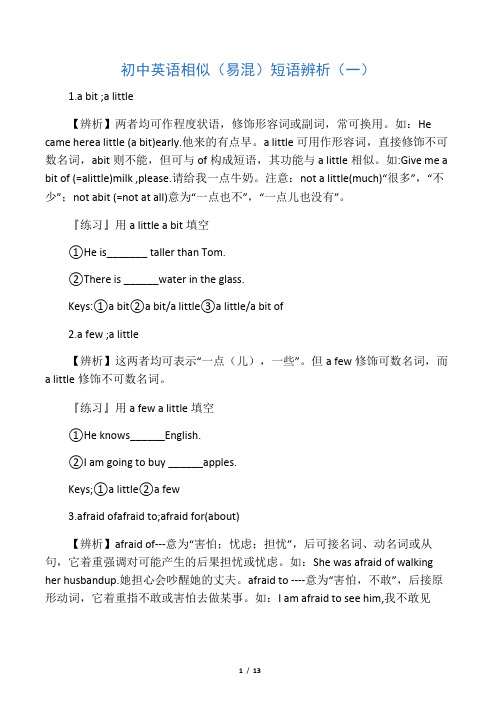
初中英语相似(易混)短语辨析(一)1.a bit ;a little【辨析】两者均可作程度状语,修饰形容词或副词,常可换用。
如:He came herea little (a bit)early.他来的有点早。
a little可用作形容词,直接修饰不可数名词,abit则不能,但可与of构成短语,其功能与a little相似。
如:Give me a bit of (=alittle)milk ,please.请给我一点牛奶。
注意:not a little(much)“很多”,“不少”;not abit (=not at all)意为“一点也不”,“一点儿也没有”。
『练习』用a little a bit填空①He is_______ taller than Tom.②There is ______water in the glass.Keys:①a bit②a bit/a little③a little/a bit of2.a few ;a little【辨析】这两者均可表示“一点(儿),一些”。
但a few修饰可数名词,而a little修饰不可数名词。
『练习』用a few a little填空①He knows______English.②I am going to buy ______apples.Keys;①a little②a few3.afraid ofafraid to;afraid for(about)【辨析】afraid of---意为“害怕;忧虑;担忧”,后可接名词、动名词或从句,它着重强调对可能产生的后果担忧或忧虑。
如:She was afraid of walking her husbandup.她担心会吵醒她的丈夫。
afraid to ----意为“害怕,不敢”,后接原形动词,它着重指不敢或害怕去做某事。
如:I am afraid to see him,我不敢见他。
afraid for (about)意为“替某人(事)担心”,其后接人或事。
英语短语、词汇辨析

• have gone 和 have been
• They have gone to England.
• 他们去英国了。(目前不在此地,或者正在去英国的路 上或者已在英国) • They have been to England. • 他们曾去过英国。(人不在英国,只表示一种经历)
Die of 与 die from:
• die of 因……而死(原因多来自内部,情感、冻饿、生 病等),后常加这样的名次:die of hunger( cold, poison, illness, old age, a disease., boredom, thirst, sorrow, disappointed love, a fever, heat… ) 死于饿 (寒冷、中毒、病、年老、疾病、无聊、渴、忧伤、失 恋、发烧、热……) • die from 由于……而死(原因常是来自外部),后常加 这样的名次: • die from a wound ( lack of food, an accident, over work, carelessness, drinking, some unknown cause…) 死于受伤(缺乏食物、事故、工作过量、粗心、饮酒过 量、不明原因……)
between和among:
between 一般指“在两者之间” among 指“三者(或三者以上)之中” She is sitting between Jane and Mary. 她坐在珍妮和玛丽之间。 She issitting among the children. 她坐在孩子们之中。 between后接三者或三者以上物体时,是把这些物体分别 看待,指每两者之间: She takes some medicine between three meals every day. 她每天在两餐之间吃药。
初中英语重点短语辨析at times,at all times,all the time
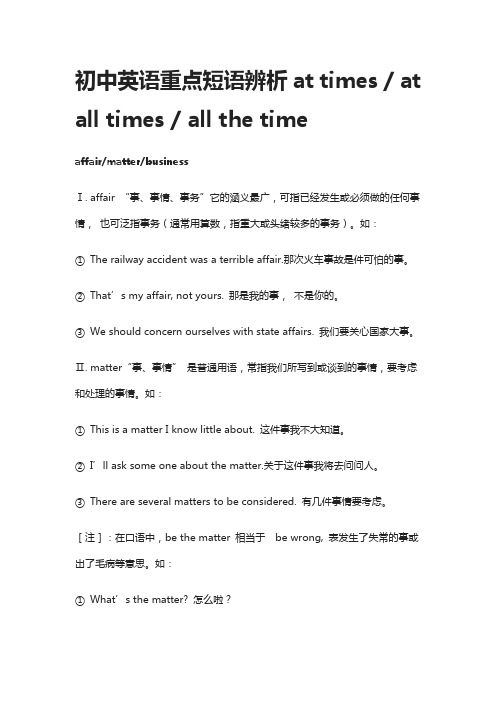
初中英语重点短语辨析at times / at all times / all the timeaffair/matter/businessⅠ. affair “事、事情、事务”它的涵义最广,可指已经发生或必须做的任何事情,也可泛指事务(通常用算数,指重大或头绪较多的事务)。
如:①The railway accident was a terrible affair.那次火车事故是件可怕的事。
②That’s my affair, not yours. 那是我的事,不是你的。
③We should concern ourselves with state affairs. 我们要关心国家大事。
Ⅱ. matter“事、事情”是普通用语,常指我们所写到或谈到的事情,要考虑和处理的事情。
如:①This is a matter I know little about. 这件事我不大知道。
②I’ll ask some one about the matter.关于这件事我将去问问人。
③There are several matters to be considered. 有几件事情要考虑。
[注]:在口语中,be the matter 相当于be wrong, 表发生了失常的事或出了毛病等意思。
如:①What’s the matter? 怎么啦?②What’s the matter with you? 你怎么啦?Ⅲ. business“生意、商业”产普通用语。
它表“事情、事务”时,往往指一种任务、责任或必须去做的事。
此外,它有时还含有轻蔑的意味。
如:①We don’t do much business with them.我们跟他们没有多少生意来往。
②It is a teacher’s business to help his pupils.帮助学生是教师的责任。
③He made it his business to fetch water for a granny. 他把为一位老大娘挑水当作自己的事。
高考英语动词短语归纳辨析
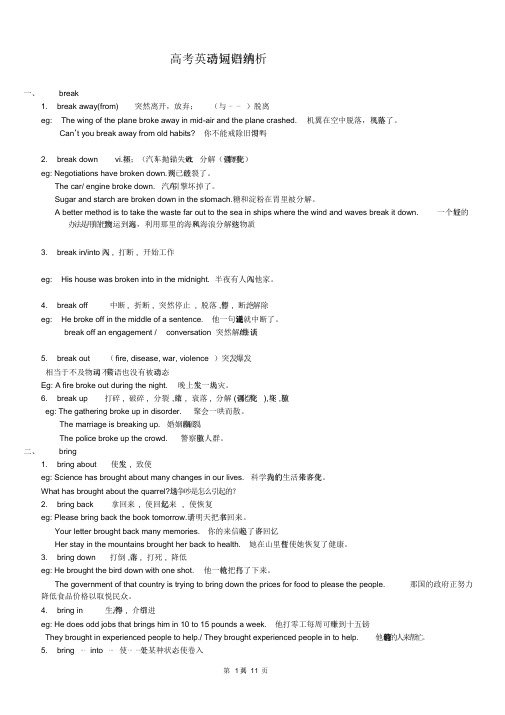
高考英语辨析动词短语归纳一、break1. break away(from) 突然离开,放弃;(与⋯⋯)脱离eg: The wing of the plane broke away in mid-air and the plane crashed. 机翼在空中脱落,飞机坠落了。
Can’t you break away from old habits? 你不能戒除旧习惯吗?2. break down vi.损坏;(汽车)抛锚;失败v t. 分解(强调物理变化)eg: Negotiations have broken down.谈判已经破裂了。
The car/ engine broke down. 汽车/引擎坏掉了。
Sugar and starch are broken down in the stomach.糖和淀粉在胃里被分解。
A better method is to take the waste far out to the sea in ships where the wind and waves break it down. 一个较好的办法是用船把废些物质。
物运到远海,利用那里的海风和海浪分解这3. break in/into闯入, 打断, 开始工作eg: His house was broken into in the midnight. 半夜有人闯入他家。
4. break off 中断, 折断, 突然停止, 脱落,暂停, 断绝,解除eg: He broke off in the middle of a sentence. 他一句话还没说完就中断了。
break off an engagement / conversation 突然解约/终止谈话5. break out (fire, disease, war, violence )突发,爆发,语态。
,也没有被动相当于不及物动词,不带宾语Eg: A fire broke out during the night. 晚上发生一场火灾。
英语常用短语辨析句子有哪些类型
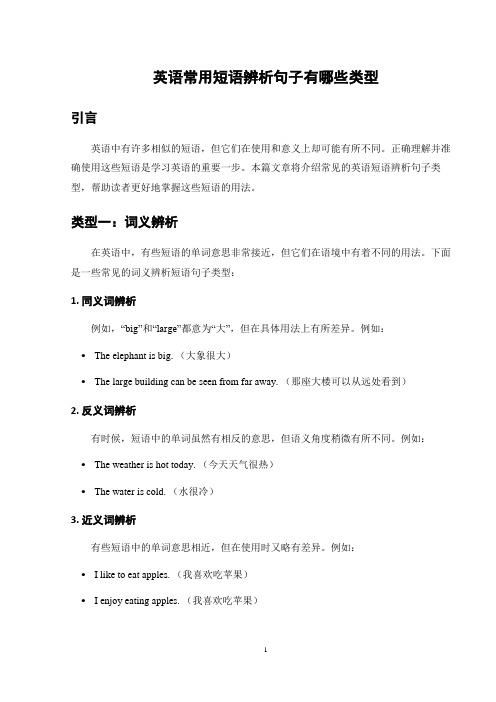
英语常用短语辨析句子有哪些类型引言英语中有许多相似的短语,但它们在使用和意义上却可能有所不同。
正确理解并准确使用这些短语是学习英语的重要一步。
本篇文章将介绍常见的英语短语辨析句子类型,帮助读者更好地掌握这些短语的用法。
类型一:词义辨析在英语中,有些短语的单词意思非常接近,但它们在语境中有着不同的用法。
下面是一些常见的词义辨析短语句子类型:1. 同义词辨析例如,“big”和“large”都意为“大”,但在具体用法上有所差异。
例如:•The elephant is big. (大象很大)•The large building can be seen from far away. (那座大楼可以从远处看到)2. 反义词辨析有时候,短语中的单词虽然有相反的意思,但语义角度稍微有所不同。
例如:•The weather is hot today. (今天天气很热)•The water is cold. (水很冷)3. 近义词辨析有些短语中的单词意思相近,但在使用时又略有差异。
例如:•I like to eat apples. (我喜欢吃苹果)•I enjoy eating apples. (我喜欢吃苹果)类型二:语法辨析在英语中,有些短语的语法使用稍有不同,这也是学习者容易混淆的地方。
以下是几种常见的语法辨析短语句子类型:1. 动词辨析在英语中,一些动词在用法上有所不同。
例如:•He made a mistake. (他犯了一个错误)•He did a good job. (他干得很好)2. 形容词与副词辨析有时候,形容词和副词的用法也容易混淆。
例如:•She sings beautifully. (她唱得很美)•She is beautiful. (她很美)类型三:习惯用语辨析英语中存在许多习惯用语,这些短语不容易根据字面意思理解。
以下是几种常见的习惯用语辨析短语句子类型:1. 成语辨析英语中的成语有时候和字面意思有些出入。
初中英语重点短语考点辨析

初中英语重点短语考点辨析考点短语解析1. fill/ fullⅠ.fill为及物动词,表“使……满”,常与介词with搭配,表达“被……充满”时用be filled with结构。
如:① The bottle is filled with water. 这只瓶子装满了水。
② He was filled with joy at the news. 听到这个消息,他内心充满了喜悦。
Ⅱ.full是形容词,多作表语,表示主语所处的状态,常见于be full of 结构中。
如:① The schoolbag is full of books. 书包里装满了书。
② He drew in an old badsket full of sand.他捞上来一个灌满泥沙的旧蓝子。
[注]:be filled with = be full of .可以互换。
但介词with与of 不能混淆。
如:The room is full of people. = The room is filled with people.2. final/ lastⅠ.final表终止或结束之意,有时带有决定性或结论性等意味。
如:① Today is the final day of this term. 今天是本学期的最后一天。
② We shall know the final results of the elections tomorrow. 明天我们将知道选举的最后结果。
Ⅱ.last “最后的、末尾的”指按次序的前后或时间的先后居于最后,并意味着后面不再有了。
如:① My house stands in the last row.② He was the last one to enter.3. finally/ at last/ in the end这三个都可以作“最后”讲,但用法不同。
Ⅰ.finally表动作的发生顺序是在“最后”,无感情色彩,只用于过去时,它居句首时较多。
英语短语辨析

英语短语辨析以下是一些常见英语短语的辨析:1. "Break the ice" vs "Break my heart"- Break the ice意为“打破僵局”或“缓和紧张气氛”,通常用于初次见面或交际场合。
例如:"He told a few jokes to break the iceat the party."- Break my heart意为“伤害我的感情”或“使我伤心”,通常用于失恋或失望的情境。
例如:"It broke my heart when she left me."2. "Drive someone up the wall" vs "Drive me crazy"- Drive someone up the wall意为“使某人发疯”或“使某人烦恼不已”,通常指某人的行为或态度让另一人感到非常恼怒或不满。
例如:"Her constant complaining drives me up the wall."- Drive me crazy意为“让我发疯”或“令我疯狂”,通常用来形容某人或某事极度令人不安或困扰。
例如:"The noise from the construction site is driving me crazy."3. "On the same page" vs "Reading between the lines"- On the same page意为“想法一致”或“意见统一”,指多人之间的共识或一致。
例如:"We need to get everyone on the same page before making a decision."- Reading between the lines意为“读懂行间之意”或“领会言外之意”,表示察觉到某人未直接表达的信息或意图。
英语短语辨析
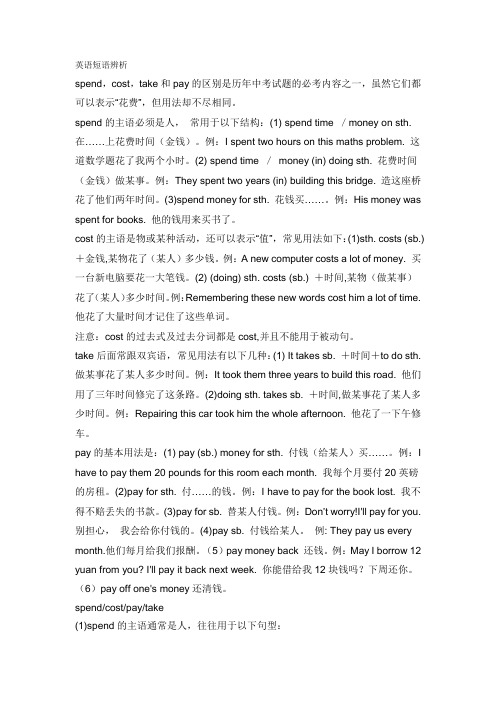
英语短语辨析spend,cost,take和pay的区别是历年中考试题的必考内容之一,虽然它们都可以表示“花费”,但用法却不尽相同。
spend的主语必须是人,常用于以下结构:(1) spend time /money on sth. 在……上花费时间(金钱)。
例:I spent two hours on this maths problem. 这道数学题花了我两个小时。
(2) spend time /money (in) doing sth. 花费时间(金钱)做某事。
例:They spent two years (in) building this bridge. 造这座桥花了他们两年时间。
(3)spend money for sth. 花钱买……。
例:His money was spent for books. 他的钱用来买书了。
cost的主语是物或某种活动,还可以表示“值”,常见用法如下:(1)sth. costs (sb.) +金钱,某物花了(某人)多少钱。
例:A new computer costs a lot of money. 买一台新电脑要花一大笔钱。
(2) (doing) sth. costs (sb.) +时间,某物(做某事)花了(某人)多少时间。
例:Remembering these new words cost him a lot of time. 他花了大量时间才记住了这些单词。
注意:cost的过去式及过去分词都是cost,并且不能用于被动句。
take后面常跟双宾语,常见用法有以下几种:(1) It takes sb. +时间+to do sth. 做某事花了某人多少时间。
例:It took them three years to build this road. 他们用了三年时间修完了这条路。
(2)doing sth. takes sb. +时间,做某事花了某人多少时间。
- 1、下载文档前请自行甄别文档内容的完整性,平台不提供额外的编辑、内容补充、找答案等附加服务。
- 2、"仅部分预览"的文档,不可在线预览部分如存在完整性等问题,可反馈申请退款(可完整预览的文档不适用该条件!)。
- 3、如文档侵犯您的权益,请联系客服反馈,我们会尽快为您处理(人工客服工作时间:9:00-18:30)。
一、no more than 与not more than1. no more than 的意思是“仅仅”“只有”“最多不超过”,强调少。
如:This test takes no more than thirty minutes. 这个测验只要30分钟。
The pub was no more than half full. 该酒吧的上座率最多不超过五成。
For thirty years,he had done no more than he (had)needed to. 30年来,他只干了他需要干的工作。
2. not more than 为more than (多于)的否定式,其意为“不多于”“不超过”。
如:Not more than 10 guests came to her birthday party. 来参加她的生日宴会的客人不超过十人。
比较:She has no more than three hats. 她只有3顶帽子。
(太少了)She has not more than three hats. 她至多有3顶帽子。
(也许不到3顶帽子)I have no more than five yuan in my pocket. 我口袋里的钱最多不过5元。
(言其少)I have not more than five yuan in my pocket. 我口袋里的钱不多于5元。
(也许不到5元)二、no more……than 与not more……than1. no more……than 表示对两者都否定,意为“同……一样不”(=neither……nor……)。
如:He is no more a writer than a painter. 他既不是画家,也不是作家。
(=He is neither a painter nora writer.)He…s no more able to read Spanish than I am. 他和我都读不懂西班牙语。
(=Neither he nor I amable to read Spanish.)I know no more Spanish than I know Greek. 我对西班牙语和希腊语同样都不懂。
(=I knowneither Spanish nor Greek.)2. not more……than 指两者都具有某种特征,但是程度不同,意为“不如”“不及”(=not so……as)。
如:She is not more clever than he is. 她不如他聪明。
(=She is not so clever as he is.)This book is not more difficult than that one. 这本书不及那本书难。
(This book is not so difficultas that one.)三、no less than 与not less than1. no less than 的意思是“多达”“有……之多”,强调多,与no more than 意思相反。
如:He made no less than £500. 他赚了多达500英镑的钱。
He paid no less than $10,000 for it. 他为此付了一万多美元。
No less than 50 people offered to buy it. 至少有50个人提出要买它。
No less than 50 passengers got killed in the train accident yesterday. 死于昨天火车车祸的旅客有50人之多。
My father,no less than I,is a baseball fan. 我的父亲不亚于我,也是个棒球迷。
2. not less than 为less than(少于)的否定式,其意为“不少于”“不下于”“至少”。
如:He has not less than 10,000 dollars. 他至少有一万元。
Not less than 500 people attended the meeting. 参加会议的至少500人。
比较:He has no less than seven daughters. 他有7个女儿之多。
He has not less than seven daughters. 他至少有7个女儿。
四、no more……than 与no less……tha n1. no more……than 意为“与……一样不”,用于否定两者。
如:She…s no more a great singer than I am. 她不是优秀歌手,我也不是。
A whale is no more a fish than a horse is. 马不是鱼,鲸也不是鱼。
He is no more an artist than you are a mathematician. 就像你不是数学家一样,他也不是艺术家。
2. no less……than 意为“和……一样”,用于肯定两者。
如:Your brother is no less wise than you. 你的兄弟跟你一样聪明。
A dolphin is no less a clever animal than a dog is. 海豚与狗同样都是聪明的动物。
Italian is no less a mother tongue for him than English. 如同英语一样,意大利语也是他的母语。
五、more than 的用法1. (指数量)多于I…ve known him for more than twenty years. 我已认识他20多年了。
2. 不只是,不仅仅是(通常后接名词、动词、从句等)He is more than a father to her. 他待她胜过父亲。
He more than smiled,but laughed. 他不只是微笑,而是放声大笑。
The result was much more than I imagined. 结果远远超出我的想象。
3. 极其,非常(通常后接形容词、副词或分词等)I was more than pleased with the pay rise. 薪水涨了,我高兴极了。
He was more than upset by the accident. 他对这次事故感到非常难过。
4. 难以,完全不能(其后通常连用情态动词can)That is more than I can tell. 那事我实在不明白。
The heat there was more than he could stand. 那儿的炎热程度是他所不能忍受的。
六、less than 的用法1. (指数量)不到,不足It…s less than half an hour's drive from here. 开车到那里不到半个钟头。
In less than an hour he finished the work. 没要上一个小时,他就完成了工作。
2. 比……(小)少She eats less than she should. 她吃得比她应该吃的少。
Half the group felt they spent less than average. 半数人觉得他们的花费低于平均水平。
3. 不太,一点也不The boys were less than happy about having a party. 开晚会男孩子们并不很高兴。
We were less than delighted to have company that day. 那天有客人我们并不太高兴。
He was less than helpful when we arrived. 我们到达时他一点也不帮忙。
七、more……than 的用法1. 比……多,比……更He has more books than me. 他的书比我多。
He is more careful than the others. 他比其他人更仔细。
2. 与其……不如He is more lucky than clever. 与其说他聪明,不如说他幸运。
He is more (a)scholar than (a)teacher. 与其说他是位教师,不如说他是位学者。
注:该句型主要用于同一个人或物在两个不同性质或特征等方面的比较,其中的比较级必须用加more 的形式,不能用加词尾-er 的形式。
八、less……than 的用法1. 不像(如)He is less honest than his brother. 他不如他哥哥诚实。
2. 比……少,不如……多We drink less coffee than tea. 我们喝咖啡不如喝茶多。
I got less money than the others did. 我比别人得到的钱少。
3. 与其……不如……I regard him less as my teacher than as my friend. 与其说我把他当作老师,不如说我是把他当作朋友。
注:表示此义时可与more……than 结构替换(但要注意词序的变化)。
如:He is less a teacher than an expert./He is more an expert than a teacher. 与其说他是老师,不如说他是专家。
九、陷阱题分析1. How beautifully she sings!I have never heard_____voice.A. a betterB. a bestC. the betterD. the best「陷阱」容易误选D,认为最高级前要用定冠词。
「分析」其实此题最佳答案为A.该句可视为I have never heard a better voice than her voice 之省略,全句句意为“她唱得多好啊!我从未听过她这么好的声音”。
请再看以下类似的实例:He is fine,never better. 他很好,比以往任何时候都好。
This bird is really lovely. I…ve never seen a finer one. 这只鸟真可爱,我从未见过这样好看的鸟。
比较以下试题,情形也大致相同:(1)“I've never found a better job.”-----“______”A. I don…t think soB. Too badC. CongratulationsD. Don‟t worry答案选C.I've never found a better job 可视为I‟ve never found a better job than this job 之省略,句意为“我从来没有找到比这份工作更好的工作”,即“这是我所找到的最好的工作”。
